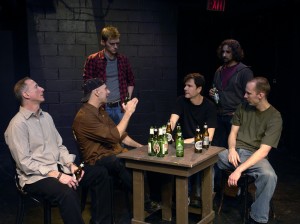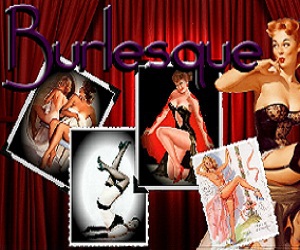
Age Out featuring Seated L-R, Nicholas John Mazza, Peter Welch, Bob Homeyer, Oliver Thrun Standing L-R, Michael Wetherbee, Patrick Pizzolorusso (Photo by Peter Welch)
There are a million stories in this city. But really, when you come right down to it – there are just about five stories that we have to tell each other at the end of a long day. There are the stories about fighting with our significant other, the stories about getting stabbed in the back by our best friend, the stories about how we must suffer through one form of bureaucracy or another, and every now and then the stories about something amazingly good that happened to us. But most of all we tell stories about our job. How we’re unemployed and looking for one, how we’re scared we’re about to lose one, how we hate the one we have or how we can’t wait to get a new one. Come to Age Out, written by Tom Diriwachter and directed by Jonathan Weber, and be prepared to hear a job tirade that will probably keep you from talking about your own job issues for a while.
Let me explain the experience of watching Age Out. Have you ever made the mistake of going out for drinks with a friend who asks you along to their workplace thing? And your friend is your ride home so you’re basically not going anywhere until it’s over? Within minutes you realize where this night is headed as you sit off to the side listening mutely as those who work together get hammered and disgustedly talk about work, and work only. This is the framework upon which the story of Age Out is hung – with the audience playing the role of the outsider, forced to listen to complaining, insults, and bad jokes until someone asks for the check. Or, in this case, until someone raises the house lights.
Age Out starts off as a rant which then, over the course of an hour and a half, turns into one big shop-talk clusterfuck which, unfortunately, leaves very little room for the audience to comfortably settle with these characters. It’s not like we can’t identify with the chatter that’s going on – it certainly is familiar enough – we’re just never given enough heart, spirit or truth from them for any of it to matter and so it remains just that – bar room chatter about a place where none of us work. So the one big question every play should answer for the audience - Why Should I Care? - never really gets answered.
It’s not like there aren’t some good threads going on here. Tim (Bob Homeyer) has worked in a restaurant for 8 years, seen it through management change, put in long hours during tough times when it counted, done his part, given the place the best years of his life – and now because of a relatively minor offense that began with a heated exchange with a customer which then escalated into Tim destroying most of the glasses in the establishment he’s been escorted from the premises and banned from his workplace. As Tim, still fresh from the incident, recounts it for his friends who come to offer support his frame of mind is clear: it’s not really what the customer said to him, or how he was treated that’s the issue. Rudeness – especially in a Times Square tourist establishment – is par for the course and one would think that after eight years Tim has developed a tough skin. Well – that’s the point. He has. But even a tough-skinned career waiter can suddenly have that moment of realization that this is what his life has become. It would drive anyone to smash up the place.
The moments of clarity that rise through the meandering, hackneyed conversations are there, no doubt. But they’re then whisked away before Tim or any of his cohorts can give too much thought to delivering them to the audience in a way that at least underscores the fact that no one is paying any attention to the time slipping by. When Tony (Nicholas John Mazza) says “We’re all very good at a marginal job” it’s actually a very telling moment. But rather than sink in the moment gets brushed aside as the play continues - anecdotes told and re-told, often in painfully nuance detail. The guys repeat themselves as new workplace people arrive, they re-tell “jokes” (Tell him what you said about the underwear!) that actually weren’t so funny in the first place and after a while there’s just nothing pushing this story forward at all. By the time someone quoted the great line “I am a soldier so my son can be a businessman – so his son can be a poet” by Thomas Jefferson my expectations for any wisdom to be drawn from this concept were low. Luckily I wasn’t disappointed, as it was followed by another round of beer, a dirty joke and some gossip.There’s something to be said for capturing the way real men talk, but no one needs to hear an actual one hour conversation take place in real time – that’s not a play. That’s eavesdropping.
The initial thread of this story is a good one. However, as more and more guys come in and blur the point with anecdotes that do less to color the story and do more to simply muddy the plot, this thread frays rather than weaves into a cohesive play. Jonathan Weber’s direction has the actors moving with far too much thoughtful contemplation; since a lot of this dialogue is of the “guys sitting around knocking back beers” variety (Remember her with the tits?) there’s no reason it couldn’t have been much faster, or even overlap in spots the way real bar conversation does – especially one fueled by workplace rage. Instead, words are spoken with emphasis rather than passion; phrases which one is used to hearing as tossed off and clipped in real life come off as heartily articulated leaving the whole thing sounding more forced and less natural – taking the nature of the piece even further from its intended mark.
Some times a rant can be turned into a play. Some times a rant is just a rant. And after this rant was over, I was still left asking – Why should I care?
~~~
Age Out written by Tom Diriwachter directed by Jonathan Weber . Theater for the New City 155 1st Avenue, between 9th and 10th Street . January 13-30 Thursday through Saturday at 8pm and Sundays at 3pm Tickets ($15/$10 students) may be purchased online or by calling 212-254-1109






{ 0 comments… add one now }